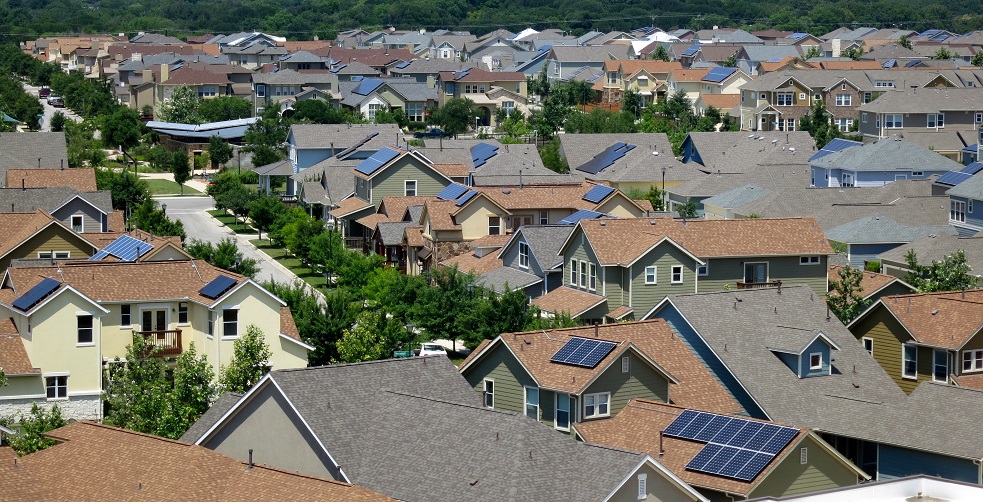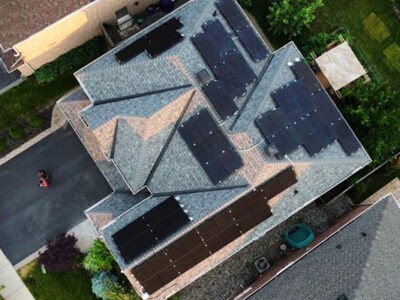- As Canadians increasingly install solar panels and heat pumps to lower their carbon footprint, some are discovering an unexpected roadblock: their home insurance policies.
- Providers are hesitant to cover homes with green technologies, citing risks and uncertainties.
- How will the insurance industry adapt to the future of renewable energy?
Canadian homeowners seeking to adopt eco-friendly technologies like solar panels face unexpected hurdles, particularly with their home insurance providers.
According to a CBC News report, Adam Szabo, a resident of Burlington, Ontario, found himself caught in the crosshairs of this issue after installing solar panels and a heat pump in 2023. His story sheds light on the broader challenge many Canadians are experiencing as they try to embrace cleaner energy solutions.
Insurance Rejection Over Solar Panels

Adam Szabo installed solar panels and a heat pump in 2023. Then his insurance company cancelled his home insurance. (Photo by Adam Szabo via CBC)
Adam Szabo’s decision to install solar panels and a heat pump was motivated by environmental and financial benefits and his hope of increasing his home’s value.
However, this green upgrade nearly cost him his home insurance with the Canadian Automobile Association (CAA), which eventually canceled his coverage due to the solar panels.
“I was confused,” Szabo told CBC News. “It just doesn’t make sense, right?” He wasn’t alone. Several other homeowners across Canada have faced similar issues after installing solar panels or other green technologies, such as electric vehicles and heat pumps.
Szabo’s experience reveals an unsettling trend: as Canadians invest in renewable energy technologies, many learn that their insurance providers are hesitant or unwilling to cover homes with these installations. This reluctance is particularly baffling given the growing governmental push for greener homes as part of Canada’s broader climate change initiatives.
Why Are Insurers Hesitant?
Some insurance companies’ reluctance to cover homes with solar panels seems at odds with the federal government’s climate targets, which include achieving net-zero emissions by 2050. However, insurance industry representatives offer an explanation rooted in risk management.
According to Rob de Pruis, national director for consumer and industry relations at the Insurance Bureau of Canada (IBC), solar panels not only increase a home’s replacement cost but may also increase the risk of electrical complications and storm-related damage.
“We’re dealing with power and… changes to your existing electrical system,” de Pruis explained. Improper installations can lead to panels being ripped off during extreme weather, potentially causing significant damage.
While it’s rare for insurers to reject homes with solar panels outright, de Pruis noted that insurers have limited experience handling claims related to this green technology. The uncertainty over potential future claims costs leads many insurers to take a cautious approach.
A Call for Adaptation

Residential rooftop solar installations. (Archive)
As the demand for renewable energy installations continues to rise, insurance companies are slowly beginning to adapt.
For instance, Pembridge Insurance, which now covers Szabo’s home, offers policies that include coverage for solar panels. Other insurers, like Aviva Canada, are revising their policies to provide up to $100,000 in coverage for renewable energy systems without requiring add-ons, starting in most parts of Canada this October.
Still, Szabo argues that the insurance industry needs to embrace these changes more rapidly. “They should be on top of this,” he said. “They should embrace change and not try to fight it.”
Perspective: Balancing Innovation and Risk
The clash between green technology adoption and home insurance highlights the tension between innovation and risk management.
As Canada pushes toward its environmental goals, the insurance industry faces a pivotal moment. For homeowners like Szabo, the solution lies in adopting renewable energy technologies and carefully navigating an insurance landscape that has yet to fully catch up with the green revolution.
On the other hand, insurers will need to reconcile their cautious risk assessments with the inevitable transition to cleaner energy, ensuring they support rather than hinder the path to a more sustainable future.















Comments